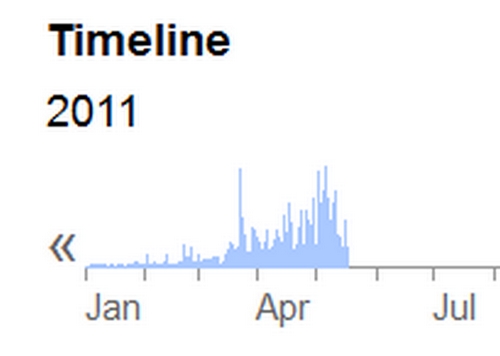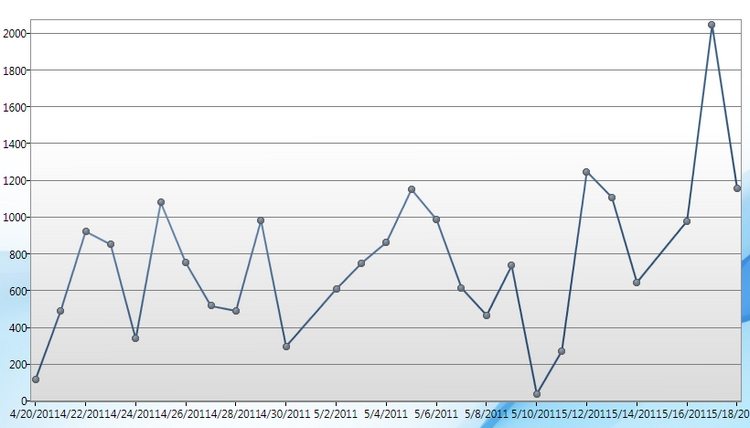
Arab Spring from the ground up
To celebrate President Obama's address I have done a small analysis of "Arab spring."
"Arab spring" was born in 2005 when Republicans argued that the US invasion of Iraq would lead to the flowering of democracy throughout the entire region. It did not happen and Arab spring was retired. Retired until 2011 when, instead of the flowering of democracy, revolt against tyranny spread across the entire region. First Tunisia, then Egypt, then Bahrain, then Libya, then Syria, then Yemen, and on. And the language of Arab spring was reborn.
I am going to examine the language of Arab spring used on Twitter -- especially in the Twitter messaging of the revolts. I started collecting Twitter messages that contained "Arab spring" April 20, 2011. I am not sure the extent of its use before that date, but Google to the rescue. This is the timeline Google Real Time gives for Arab Spring for 2011.
 |
The problem with Google Real Time is the insistence that one does not need numbers. From the timeline it is clear that there was very little Arab spring into March. There was a spike in March, it fell again and then increased in usage. But we do not know what those numbers are. They might be hundreds; they might be millions. However, I have the numbers for my collection, which for the time period I collected, should be about as complete as theirs.
 |
The numbers are in the hundreds -- rising above a thousand only 6 times in the month. For the month I collected just over 20,000 twitter messages containing Arab spring.
There are the numbers from the ground for the actions Arab spring is intended to point to though the language on the ground is different. But first the search strategy. One of the conventions that has developed to communicate more effectively via Twitter is the hashtag. A hashtag is a # with characters following it. The revolt in Bahrain first used #feb14 as their primary hashtag. Eventually #bahrain became equally popular. The utility of a hashtag is establishing a domain of communication. You could search for Bahrain instead of #feb14. You would get some of the same messages, but you would also pick up a lot of messages that were unrelated to the revolt. When Twitter users want to communicate about a topic they most frequently develop a hashtag for which they can search to find what people have to say. I searched the Twitter database for: #feb14, #libya, #syria, and #yemen for an extended period of time, but will show only the numbers for three recent days.
#Feb14 |
#Libya |
#Syria |
#Yemen |
|
5/15 |
6821 |
12310 |
32928 |
4910 |
5/16 |
7723 |
16580 |
27018 |
4287 |
5/17 |
9804 |
12702 |
26453 |
4175 |
24348 |
41592 |
86366 |
13372 |
In three days I collected 165,711 twitter messages by searching for these hashtags. In these streams of communications they organize their protests, they communicate their plight to the larger world, and they constitute themselves as a people who can stand against the tyrant [Boynton, 2011]. But here I am interested in how they connect to each other.
What about Arab spring? Is that how they talk about each other? Is Arab spring their badge for who they are as a people? The answer is no. Arab spring appeared in only 186 of the 165,711 Twitter messages. Arab spring is other peoples language, but not theirs.
What about hashtags? Every message was found by searching for a hashtag, but a person can include as many hashtags in a message as will fit within the 140 character limit. The addition of hashtags is a way of pointing to a connection. When people sending Twitter messages about Bahrain included #egypt in their message they were pointing to the connection between what the Egyptians had done and what they were doing. These are, then, connections by pointing rather than by adopting a label.
#feb14 |
#libya |
#syria |
#yemen |
|
#feb14 |
165 |
306 |
276 |
|
#libya |
167 |
4564 |
2855 |
|
#syria |
307 |
4531 |
3149 |
|
#yemen |
277 |
2821 |
3096 |
|
arab spring |
19 |
77 |
62 |
29 |
total |
24348 |
41592 |
86366 |
13372 |
The columns indicate the data file that was collected with that search term. So the #feb14 column is the data file containing 167 references to #libya found in 24,348 tweets, 307 references to #syria found in the same 24,348 tweets, 277 references to #yemen, and 19 references to Arab spring.. Those are the numbers. What should one make of them? First, in all cases references to other countries far exceed the use of Arab spring. Arab spring seems as little a part of the vocabularly looked at this way as it was compared to the total number of Twitter messages. And references to other countries are modest at best. Most of the messages are addressed to the the 'local' situation. As I noted earlier the messages are used to organize locally, to share one's plight with the wider world and to constitute the population as a people who can stand against the tyrant. While what has happened elsewhere may serve as basis for thinkng we can do it too, the communication is about doing it. And doing it is our very own tryant to whom we must stand up.
To add to that interpretation the numbers for references to Egypt and Tunisia are in the next table.
#feb14 |
#libya |
#syria |
#yemen |
|
#egypt |
1122 |
4484 |
6216 |
2714 |
#tunisia |
140 |
1881 |
803 |
1141 |
total |
24348 |
41592 |
86366 |
13372 |
Egypt is far more important for people using the #feb14 hashtag than any of the other countries they refer to in the table above. For each collection Egypt exceeded or was almost equal to the country most referred to with a hashtag. Tunisia, on the other hand, is more like the forgotten leader with very modest numbers of references. Egypt has become a central symbol. In one way it was before any of these were. It stands out, but the references are still modest.
These are people putting their lives in danger to stand against their local tyrant. While there are connections we should probably understand them as people embedded in their own context.
Conclusion
Arab spring is cheap talk. It is not the language of the people in the street who are fighting to free themselves from their own local tyrant. It is not the language of careful observation and interpretation. Egypt is not Tunisia. Bahrain is not Egypt. Libya is not Bahrain. ETC. It is the language of people who do not want to deal with the lives of people and the countries in which they live. It is language that glosses over the 'details' to give the 'big picture' as though the big picture is not about the details.
One final word: On the day of the president's address Arab spring was found in almost 6,000 twitter messages. President Obama's address about the U.S. in relation to the revolts against tyrants does not contain the phrase Arab spring.
Methodological note.
There is a good deal of variation from day to day in the number of Twitter messages that include these hashtags. Three days is not exactly a solid basis for conclusions. And, as strange as it may seem, these were not particularly busy days. Especially at the initation of revolt the number of messages is manyfold the numbers for these three days. But dealing with the multiple millions of messages I have collected poses a difficult problem. The numbers overwhelm my software. I will have to figure something out because I think the most interesting learning will come when I can trace the developments in these message streams over time.
I am delighted by how little error is found in the collections. The #feb14 collection contained 167 references to #libya, and the data file for #libya contained 165 references to #feb14. Since the two cells should have been equal even though it was two different searches it looks like the searches worked very well. The same level of correspondence is true for all of the other pairs that should be exactly the same. They are not the same, but they are very close.
The point about how the hashtags are used becomes clearer with this table.
#feb14 |
#libya |
#syria |
#yemen |
|
#feb14 |
24348 |
165 |
306 |
276 |
#bahrain |
22508 |
1633 |
1925 |
1957 |
The columns are the data collections. The rows give the number from each data collection using #feb14 and #bahrain. #feb14 was where the revolt in Bahrain started. Given the collection strategy every message in that set would include #feb14. They also overwhelmingly contain #bahrain as that came to be used in the messages. But #feb14 remains alive for them. For the people involved in other streams of communication #feb14 has little meaning and they are much more likely to use #bahrain. These are conventions and one can notice how they come to operate differently in context.